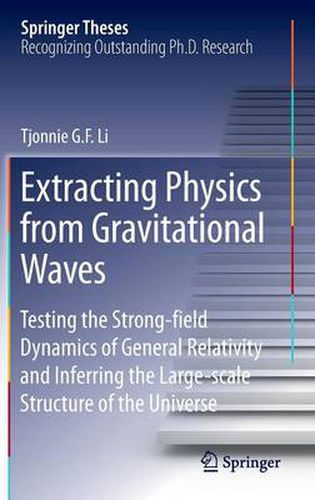Readings Newsletter
Become a Readings Member to make your shopping experience even easier.
Sign in or sign up for free!
You’re not far away from qualifying for FREE standard shipping within Australia
You’ve qualified for FREE standard shipping within Australia
The cart is loading…






This title is printed to order. This book may have been self-published. If so, we cannot guarantee the quality of the content. In the main most books will have gone through the editing process however some may not. We therefore suggest that you be aware of this before ordering this book. If in doubt check either the author or publisher’s details as we are unable to accept any returns unless they are faulty. Please contact us if you have any questions.
Tjonnie Li’s thesis covers two applications of Gravitational Wave astronomy: tests of General Relativity in the strong-field regime and cosmological measurements. The first part of the thesis focuses on the so-called TIGER, i.e. Test Infrastructure for General Relativity, an innovative Bayesian framework for performing hypothesis tests of modified gravity using ground-based GW data. After developing the framework, Li simulates a variety of General Relativity deviations and demonstrates the ability of the aforementioned TIGER to measure them. The advantages of the method are nicely shown and compared to other, less generic methods. Given the extraordinary implications that would result from any measured deviation from General Relativity, it is extremely important that a rigorous statistical approach for supporting these results would be in place before the first Gravitational Wave detections begin. In developing TIGER, Tjonnie Li shows a large amount of creativity and originality, and his contribution is an important step in the direction of a possible discovery of a deviation (if any) from General Relativity. In another section, Li’s thesis deals with cosmology, describing an exploratory study where the possibility of cosmological parameters measurement through gravitational wave compact binary coalescence signals associated with electromagnetic counterparts is evaluated. In particular, the study explores the capabilities of the future Einstein Telescope observatory. Although of very long term-only applicability, this is again a thorough investigation, nicely put in the context of the current and the future observational cosmology.
$9.00 standard shipping within Australia
FREE standard shipping within Australia for orders over $100.00
Express & International shipping calculated at checkout
This title is printed to order. This book may have been self-published. If so, we cannot guarantee the quality of the content. In the main most books will have gone through the editing process however some may not. We therefore suggest that you be aware of this before ordering this book. If in doubt check either the author or publisher’s details as we are unable to accept any returns unless they are faulty. Please contact us if you have any questions.
Tjonnie Li’s thesis covers two applications of Gravitational Wave astronomy: tests of General Relativity in the strong-field regime and cosmological measurements. The first part of the thesis focuses on the so-called TIGER, i.e. Test Infrastructure for General Relativity, an innovative Bayesian framework for performing hypothesis tests of modified gravity using ground-based GW data. After developing the framework, Li simulates a variety of General Relativity deviations and demonstrates the ability of the aforementioned TIGER to measure them. The advantages of the method are nicely shown and compared to other, less generic methods. Given the extraordinary implications that would result from any measured deviation from General Relativity, it is extremely important that a rigorous statistical approach for supporting these results would be in place before the first Gravitational Wave detections begin. In developing TIGER, Tjonnie Li shows a large amount of creativity and originality, and his contribution is an important step in the direction of a possible discovery of a deviation (if any) from General Relativity. In another section, Li’s thesis deals with cosmology, describing an exploratory study where the possibility of cosmological parameters measurement through gravitational wave compact binary coalescence signals associated with electromagnetic counterparts is evaluated. In particular, the study explores the capabilities of the future Einstein Telescope observatory. Although of very long term-only applicability, this is again a thorough investigation, nicely put in the context of the current and the future observational cosmology.